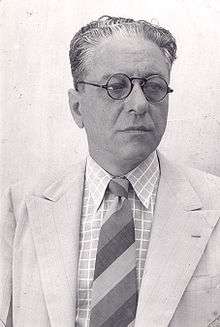Eduardo Martínez Celis
| Eduardo Martínez Celis | |
|---|---|
 | |
| Born |
29 October 1890 Zamora de Hidalgo, Mexico |
| Died |
5 November 1943 (aged 53) Monterrey, Mexico |
| Cause of death | Cardiac arrest |
| Nationality | Mexican |
| Occupation | Journalist |
| Religion | Roman Catholic |
| Spouse(s) | Josefina López García |
| Children | Mario, Rubén, Aglavena, José, Ana María and Eduardo |
| Parent(s) | Domingo Martínez Barrón and Josefa Celis Arceo |
Eduardo Martínez Celis (29 October 1890, Zamora, Michoacán – 5 November 1943, Monterrey, Nuevo León) was a Mexican journalist, author and politician.
Early life

His parents were Josefa Celis Arceo, a native of Jiquilpan, Michoacán, and Lt. Col. Domingo Martínez Barrón, a native of Santiago de Querétaro.
Although Martínez Celis was born in Zamora, Michoacán, he began his studies in Guadalajara, Jalisco. Due to his father’s military duties, in 1904 Eduardo and his family moved to Monterrey, where he completed his higher education at the Colegio Civil. Years later—when this school became the Escuela de Bachilleres—, Martínez Celis was to become a teacher of literature at said institution.
Professional life
His journalistic career began in 1909 as a reporter for the newspaper El Renacimiento; he continued with a series of directive positions in El Noticiero, El Combate and El Heraldo—all in Monterrey. Following this period, he lived for some time in Mexico City, where he collaborated in El Demócrata and El Pueblo de México. Upon returning to Monterrey, he joined El Progreso and Nueva Patria. Alongside Jesús Cantú Leal, Ricardo Arenales and Federico Gómez, he co-founded El Porvenir in 1919, being the newly-founded newspaper's first editor-in-chief. Afterwards, Martínez Celis would assume the direction of El Tiempo, when this newspaper was founded in 1936.
An elegant and acute writer, Martínez Celis was a true master of certain brief essays that he published in El Porvenir under the pseudonym of El Abate Sieyés, in a section that he first called Tópico del día and later Un tópico cualquiera.
In 1933, Eduardo wrote a book of verses that he titled Rima íntima, of which only a few copies were printed for his wife, Josefina López García, and their six offspring.
He also authored the historical essays El Cuarto Poder a través de los siglos. - Reseña histórica del periodismo en Nuevo León desde 1824 hasta 1936, published in a special edition of El Tiempo on August 5, 1937, with copies on the front pages of the principal newspapers, weeklies and magazines of Mexico; and El teatro en Monterrey a través de 75 años, published in El Porvenir on January 31, 1941.
Martínez Celis was also a prolific playwright; among the works that he co-authored with David Alberto Cossío are: La rebelde, Deuda de gloria, El abismo, El diablo romántico, Mujeres de acción and Los amigos del señor gobernador.
Political activities
He was a notable speaker and took an active interest in politics, presiding as vice-president of the Partido Constitucional Progresista (Progressive Constitutionalist Party) of Monterrey, which, in October 1911, nominated Francisco I. Madero and José María Pino Suárez as its candidates for president and vice-president of Mexico, respectively; Martínez Celis was also director of El Combate, the semi-official newspaper of the Partido Constitucional Progresista. From 1920 to 1922, he occupied the office of congressman in the Nuevo León Legislature representing the Partido Constitucional Independiente (Independent Constitutionalist Party); however, all these activities were overshadowed by his prominent journalistic career.
His life was suddenly cut short on November 5, 1943 when he succumbed to a cardiac arrest in Monterrey, the city where two streets bear his name.
Selected works by Eduardo Martínez Celis
Poetry:
- Rima íntima - (1933)
Essays:
- Un tópico cualquiera
- El Cuarto Poder a través de los siglos. - Reseña histórica del periodismo en Nuevo León desde 1824 hasta 1936 - (1937)
- El teatro en Monterrey a través de 75 años - (1941)
Theater:
- La rebelde - (1913)
- Deuda de gloria - (1915)
- El abismo - (1916)
- El diablo romántico - (1932)
- Mujeres de acción - (1933)
- Los amigos del señor gobernador - (1934)